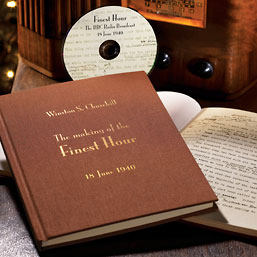
The Problem with Recorded Churchill Speeches
Q: Were the recorded speeches edited?
I’m analyzing some of Churchill’s speeches for an academic paper. After listening to the audio files and reading along I found a lot of paragraphs which were left out in the radio speeches. It’s especially evident in “Their Finest Hour” from June 18th, 1940 where only a fifth of the text seems to have made it to the radio. At one point it sounds like the audio file has been edited. Were the audio files full radio speeches or just excerpts? —N.K., Copenhagen
A: Yes, most are not the original appearances
Depending on the one you are listening to, it is likely a postwar recording from Churchill’s memoirs and speeches. He made these for HMV/Decca, and all were edited to some degree; some were truncated in later, shorter recorded collections. The original collection does contain some contemporaneous broadcasts. For example the June 18th “Finest Hour” speech was rebroadcast by Churchill that evening over the BBC. No recordings were permitted in the House of Commons at that time. Of course, a few are taken from broadcasts which were not delivered in Parliament beforehand.
Levenger’s 2006 book, The Making of the Finest Hour, includes a CD containing the full broadcast. (A glance at Bookfinder.com shows this limited edition to be quite affordable at present.) But many Churchill CDs and LPs of his speeches contain only excerpts. Some of these were taken from the BBC broadcasts; most were recorded by Churchill years afterward.
But they were his alone….
Many who heard his original speeches in the House of Commons said the subsequent broadcasts (and the much later postwar recordings) lack the fire of the originals. And rumors have long circulated that an actor read some of them for the BBC. The historian Sir Robert Rhodes James put paid to all that years ago. Sir Robert noted:
Harold Nicolson lamented that it was necessary to bully Churchill into broadcasting. Referring to the June 18th “Finest Hour” broadcast, Nicolson said: “He just sulked and read his House of Commons speech over again.” Nicolson was Information Minister at the time. Churchill never liked broadcasting, but there is no evidence whatever that he was replaced by anyone, and speech researchers have confirmed this.
…and not Norman Shelley’s
It was long rumored that the actor Norman Shelley (a famous “Watson” in the Sherlock Holmes productions), delivered Churchill’s 4 June 1940 “Fight on the Beaches” speech over the BBC after WSC had delivered it in the House of Commons. Shelley did a passable imitation of Churchill, and is known to have spun off a wartime speech or two in later times. But the “Beaches” speech was not even rebroadcast that evening. Countless witnesses have stated that an announcer read only excerpts.
Nor did anyone but Churchill deliver any other speeches during the war. His private secretary, Sir John Colville, repeatedly said: “If anyone else had delivered them, I would have known, it, because I was there.”
Further reading
Ronald I. Cohen, “Churchill Recordings: Speeches and Memoirs,” Hillsdale College Churchill Project, 2016.
Richard M. Langworth, “Blood, Toil, Tears and Sweat: Origins of a Famous Phrase,” 2018.






